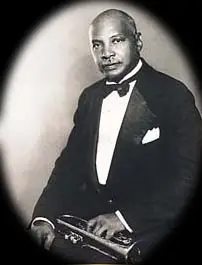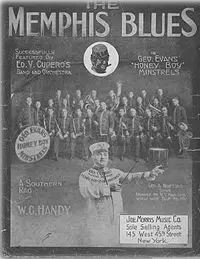WC HANDY

WC Handy was the ‘Father of the Blues’, at least that’s what it said in his autobiography. It is probably more true to say he was a talented composer who became a great collector and populariser of the Blues, who was also largely responsible for bringing this local folk music from the Mississippi Delta to national and world attention. This makes him an important factor in the origins of Blues music .
William Christopher Handy was born in 1873 in Florence Alabama, the son and grandson of religious ministers. He trained and worked as a teacher but had musical ambitions, taking a string quartet to the World’s Fair in Chicago in 1893. He took up the cornet and began working in travelling Minstrel troupes.
These shows would tour the countryside with a big tent, presenting comic sketches, acrobats, dancers and magicians, accompanied by light classical, dance music and ragtime. In 1896 the talented young Handy began a six year spell as musical director of Mahara’s Minstrels, seeking out new styles and expanding his musical horizons.
In 1903 Handy recalls hearing a sad song played by a local man at Tutwiler, Mississippi as he waited at the railroad station. A lyric line was repeated and a third line was given in response. The three chord progression moved from tonic to subtonic to dominant, using ‘blue notes’- flattened 3rds and 7ths. Handy was impressed and made a mental note of the music he heard that day, played by a man using a knife on the guitar strings in the newly popular ‘Hawaiian style’.
 Handy had moved to nearby Clarksdale in 1903 where he led an orchestra called The Knights of Pythias. He was commissioned by local big-wig EH Crump to write a campaign song in his bid to be elected as Mayor of Memphis. The tune was a 12-bar ‘Blues’ called ‘Mr. Crump’, and it helped ‘Boss’ Crump gain a hold on power in the city which lasted four decades. Handy moved to Memphis and he reworked the song as ‘Memphis Blues’. It was published as sheet music in 1912, this being before the age of popular recorded music, but it is not a ‘true’ 12-bar Blues as it has a 16-bar bridge. It was a big hit and was followed up by ‘St. Louis Blues’, ‘Yellow Dog Blues’ and ‘Beale St. Blues’, starting a wave of popularity for the 12-bar form.
Handy had moved to nearby Clarksdale in 1903 where he led an orchestra called The Knights of Pythias. He was commissioned by local big-wig EH Crump to write a campaign song in his bid to be elected as Mayor of Memphis. The tune was a 12-bar ‘Blues’ called ‘Mr. Crump’, and it helped ‘Boss’ Crump gain a hold on power in the city which lasted four decades. Handy moved to Memphis and he reworked the song as ‘Memphis Blues’. It was published as sheet music in 1912, this being before the age of popular recorded music, but it is not a ‘true’ 12-bar Blues as it has a 16-bar bridge. It was a big hit and was followed up by ‘St. Louis Blues’, ‘Yellow Dog Blues’ and ‘Beale St. Blues’, starting a wave of popularity for the 12-bar form.
In 1917 Handy moved his operation to New York where he set up a successful music publishing company, and is credited with introducing a new popular dance, the ‘Fox Trot’. Inspired by Handy, Perry Bradford wrote ‘Crazy Blues’, which was recorded Mamie Smith in 1920, and is recognised as the first Blues record. This ushered in the Golden Age of classic Blues Divas like Ma Rainey and Bessie Smith, as female singers who came into the studio to interpret the contemporary sounds made by the pioneers of Country Blues. Around this time Handy broke up with his lyricist Harry H Pace, who left to set up Black Swan Records, an entirely African American company dedicated to expanding the market for the new ‘race music’. Handy set up his own record company too, but it soon failed. His eyesight was also failing badly, but he did have some remission later.
Bessie Smith recorded a version of ‘St. Louis Blues’ with Louis Armstrong in 1925, providing Handy with his biggest selling record. He continued to perform, touring with Jelly Roll Morton and organising a Blues Concert at Carnegie Hall in 1928. The following year he co-produced a film of Bessie Smith performing ‘St. Louis Blues’. This was one of the first ‘talkies’ and it is a fantastic document of the ‘Harlem Renaissance’ as black culture became available to America and the world.
A version of St.Louis Blues;
 WC Handy can be credited with discovering and popularising the Blues and his name is memorialised by a park at Beale Street in Memphis. There is an annual 10-day Blues Festival held in his name in Muscle Shoals, Alabama, and the most prestigious award given by the Blues Foundation was known for many years as the WC Handy Awards or ‘Handys’.
WC Handy can be credited with discovering and popularising the Blues and his name is memorialised by a park at Beale Street in Memphis. There is an annual 10-day Blues Festival held in his name in Muscle Shoals, Alabama, and the most prestigious award given by the Blues Foundation was known for many years as the WC Handy Awards or ‘Handys’.